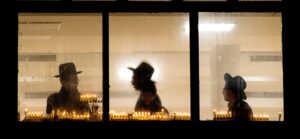Candidates for elite military units, the Navy Seals, Green Berets, and British SAS, conclude months of torturous weeding-out with a final ordeal. A physically exhausted, sleep-deprived, injured SAS applicant related his test’s end. He arrived at the designated finishing point, within the time limit, barely able to walk. There were the instructors on a truck’s tailgate, with an urn of coffee and fresh donuts, smiling congratulations. As the recruit reached the truck, it drove off.
These selection processes are composed of physical tasks, but designed primarily to test the applicants’ will. For, however challenging the test, had they been applied not to Olympic-grade athletes, but to regular folk whose lives depended upon their completion, it’s possible the pass-fail ratio might not be drastically different.
The training memoirs all cite the magnificent physical specimens who opted out during some phase of training when other less likely men persevered. Which was the purpose of the training: to select those who could learn to make the body do the mind’s bidding.
***
Israel’s secret weapon, as Golda taught, was Ain Brera: No Alternative. A companion phrase is Herzl’s Im Teratzu, ein zo Agadah. This is generally rendered “If you will it, it is no dream.” A better translation: “It is no fable (or tale).” The tale to which Herzl refers is The Torah. I understand him to mean that it is not merely a tale, that it is a promise: that God will return the Jews, from the ends of the earth, to their homeland. Herzl’s phrase is a reminder that the promise will be fulfilled, but we must act to fulfil it. That, as the age of miracles is past, God can only act in the world through human agency.
The handiest and most destructive phrase for the challenge begins “I wish”. No desire framed as a wish can ever be fulfilled. For who would fulfil it, if not the utterer, whose plea is actually a confession of failure? The replacement of the introductory “I wish…” with “I will” is Herzl’s instruction.
Through the Five Books of Moses — the Jews repeatedly face the lesson of the SAS: the test does not begin until one is assured the test is over and he has failed.
The escapees from Egypt found themselves wedged between Pharaoh’s murderers, and the Red Sea. They cried to God, and cried out against Moses: “Weren’t there enough graves in Egypt that you brought us out here to die? It would have been better to be slaves in Egypt than to die in the desert.”
Moses told them to stand firm and see what God would do to rescue them. He continued in what, to me, has been a most instructive verse: “The Egyptians you see today, you will never see again.”
I’ve found this a reliable comfort in a life with a sufficiency of both challenges and failures. I understand it thus: not that trust in God will bring about a foreseen resolution, but that although it may not, it will bring about God’s intended ends, which are finally, unknowable, save that we should trust.
The verse promises that acting on such trust will eradicate our fear; and, so, inspire courage in the subsequent trials we will surely encounter. But that the Egyptians — that is, the trial confronting us today, faced today — we need never face again.
Our lives are short, and we are often affronted, and often confused. The Torah acknowledges our insufficiencies as the human condition: that we, unaided, are incapable of facing, let alone surmounting, tasks beyond our understanding. Because our understanding is limited.
The alcoholic is addicted to both alcohol and to doubt, which he understands as certainty. That he cannot go through life without alcohol is the surest thing he knows, in fact, it is the central belief of his life. He tells his sponsor in AA that he can’t imagine life without a drink and is told no one can; and is asked to do something quite different: to go through the next 24 hours without drinking. Like the Jews at the Red Sea, he is challenged to enter a state, which he can only understand as death. But without death, there is no rebirth.
The Special Forces ordeals are designed to break the mind, so that it can be reformed first to imagine then to accomplish that which, prior to the reconstruction, the applicant would have been considered impossible.
The Rededication of the Temple in 165 B.C.E. required oil sufficient for eight days of purification. The Maccabees only had enough for one day. They did not, however, wish that God would perform a miracle, but listened to God, who told them to proceed in any case. They did so, preferring God’s understanding to their own — an event worthy of consideration.
Happy Hanukkah.
Disclaimer
Some of the posts we share are controversial and we do not necessarily agree with them in the whole extend. Sometimes we agree with the content or part of it but we do not agree with the narration or language. Nevertheless we find them somehow interesting, valuable and/or informative or we share them, because we strongly believe in freedom of speech, free press and journalism. We strongly encourage you to have a critical approach to all the content, do your own research and analysis to build your own opinion.
We would be glad to have your feedback.
Source: UnHerd Read the original article here: https://unherd.com/


